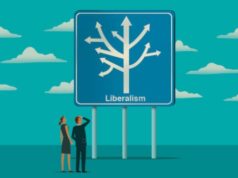For most of history (and unfortunately in many places even today) the average individual was a slave – a de facto slave if not a de jure one. He or she – the aam aadmi, as it were, was fodder for someone else. Fodder for the monarch. Fodder for the feudal lord. Fodder for the clergyman or the brahmin. And when ‘law and order’ (which should not be confused with ‘rule of law’) was not maintained – he became fodder even for the good-old barbarian.
Obviously even the feudal lord could be forced to do away with his property and life if the king really desired so. Even the king could not marry someone of another sect or caste because of the state church or temple or mosque. And the priest, like many others, most definitely could not lead a ‘hedonistic’ life publicly lest he be physically attacked by his fellow believers.
So many individuals were forced to act, some more frequently and some less frequently, against their own choice – and not because of persuasion of morals or money. But they were forced to act because of an explicit or implicit threat of violence: a threat, when taken to its logical conclusion, to take away their very lives itself.
Now the libertarian or the classical liberal philosophy would be simplistic if just a few lines could describe it – what with rather rabid debates occasionally flaring up amongst various libertarians on the smallest of nuances! But, I do find the core of the libertarian philosophy to be charmingly simple. It is basically that you are free to do whatever you want so long as it does not threaten somebody else – his or her life, liberty and property. OK, so descending from the 30,000 feet view, how is all this relevant in our daily lives?
Let’s see. Do you believe in not interfering with an individual’s sexual, religious and other preferences as long as others’ preferences are not hurt? (That is materially, not “sentimentally”) Do you agree that free markets have created unprecedented wealth – in fact so much wealth that the rich of a few centuries earlier might not mind being on welfare today? If the answer is even a qualified yes to most of the questions above – there is a very high chance that you are a liberal!
But many believe – so do I – in equality of opportunity even if it means some redistribution. But here we must move beyond this normative consensus, and ask “how”? Perhaps we should be thinking about funding students and not schools (through vouchers) because individual choice and market competition have shown to have better educational outcomes per rupee spent, according to many international studies. Similarly, vouchers for health coverage, food security and so on.
The genuine liberal would always stand in defence of the rule of law, free speech, civil liberties, privacy and oppose an intrusive, big Orwellian government – whether or not he/she supports wars to ‘liberate’ foreign countries. There will always be exceptions, there will always be more moderate and more dogmatic liberals – but our guiding star will always be respecting the uniqueness, and indeed the sentience, of every individual.
(Cross-posted at http://swaraj.nationalinterest.in)
Post Disclaimer
The opinions expressed in this essay are those of the authors. They do not purport to reflect the opinions or views of CCS.





